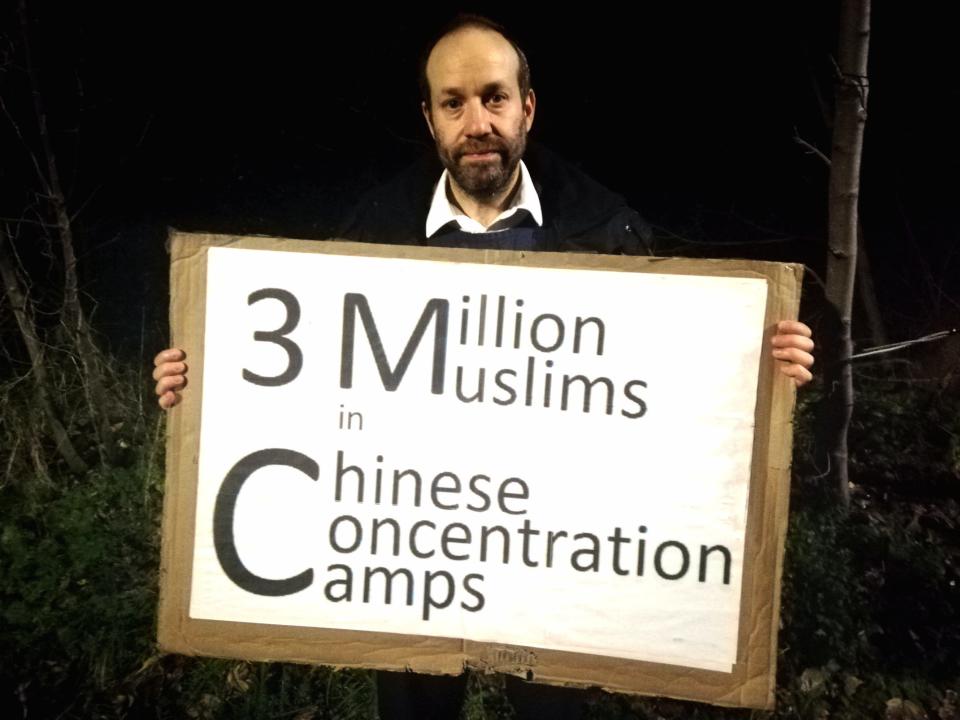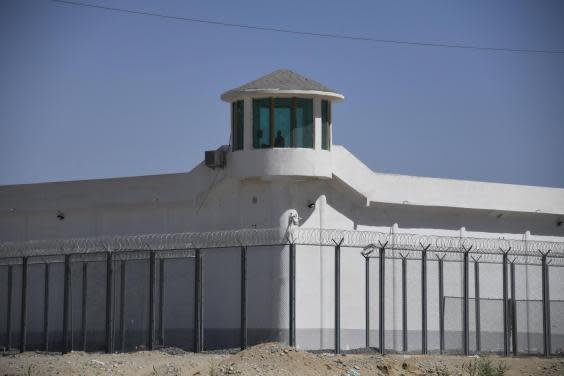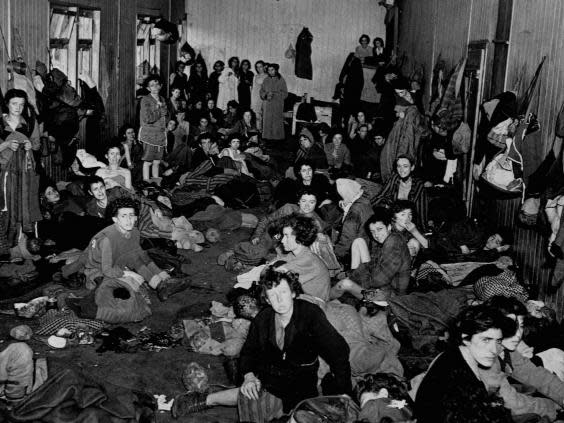Meet the British Orthodox Jew standing up for China’s Uighur Muslims

Standing by the side of the road, a lone protester pivots backwards and forwards to display his sign to every passing car. It reads: “3 Million Muslims in Chinese Concentration Camps.”
Andrew pitches up at the Chinese Embassy office in leafy Hampstead every single Tuesday and Wednesday. Sometimes he has company, but often he is alone. He’s been coming without fail for almost a year.
In late 2018, satellite images of the camps in which Uighur Muslims are being detained for what China has termed “re-education” began to emerge. Before then there had been unsubstantiated rumours of the facilities, but for Andrew, this was “undeniable proof” of concentration camps in Xinjiang.
“Because of my personal history. I didn’t feel I could sit at home,” he says.
Andrew describes himself as a “typical Orthodox Jew”. He lives in London’s Golders Green with his family, and works as a businessman. While he is protesting against one of the world’s greatest superpowers, he says he does not feel safe sharing his full name.
China has been accused of genocide by experts as reports of ethnic minority Uighur women forced to have abortions have emerged. Women who escaped the high-security camps also spoke of widespread sexual torture. UN figures have put the numbers of Uighurs and other Muslim minorities forced into “political camps for indoctrination” at between one and two million, while Andrew took his statistic of three million from a UN special rapporteur.
More recently, China has also started to demolish Uighur graveyards.
Boris Johnson is yet to address the Uighur situation publicly, following Theresa May who, during her time as prime minister, remained silent on the issue. But the UK called on Beijing to respect “freedom of religion or belief” when the country led 22 other countries in condemning China’s actions at the UN human rights committee meeting last October.
“Something on this scale, with millions of people, women, men and children in concentration camps hasn’t happened before, except once,” Andrew explains.
Members of Andrew’s family were gassed at Auschwitz concentration camp. His wife’s mother was hidden from the Nazis by the people of her village, risking their lives to save hers.
“We said, the world said, never again.”
The lack of international uproar is what frightens Andrew the most. He explains that Germany opened the first of its concentration camps in 1933, but they didn’t formally become extermination camps until nine years later. During that time the world largely looked the other way, he says.
Nazi Germany hosted the 1936 Olympics, and while athletes from around the world competed in Berlin, Jews, Romani Gypsies, and political prisoners were being held in Dachau, Berlin-Marzahn and Sachsenhausen concentration camps.
“Virtually everybody I speak to in the Jewish community sees the parallels. You know, we were in concentration camps, and these people are,” Andrew says.
However, Professor Steve Tsang, director of the SOAS China Institute, sees this comparison with the Holocaust as “tricky”.

Genocide is a deliberate act of killing a large group of people, and we are not seeing that in this case, he is keen to point out.
“The Chinese are not killing the Muslims in the gas chambers, killing them like the Third Reich did,” he says.
“But we are seeing an attempt to fundamentally change, forcefully, the cultural and religious practices of a people.” This fits with many definitions of cultural genocide, including that used by the UN.
Tsang is sympathetic to why people of Jewish decent would make such a comparison. “They are remembering the events that led to the holocaust,” he says.
“They are raising it before it gets to a Holocaust stage.”
On this particular cold January night, Andrew has been joined by some individuals who are part of, or have seen the protest advertised by the Boycott Divestment and Sanctions China Facebook group.
Jumina Qureshi, a trainee science teacher from Neasden, has come out for her first protest, and she’s brought her four young children and husband. The family has doubled tonight’s numbers, and Andrew is thrilled.
“This is quite emotional actually, seeing Andrew here. Despite our history – you know, Jews and Muslims, he’s out here saying it’s not OK.”
“It just goes to show, interfaith dialogue is more important now than ever,” she says.
Uighur numbers in the UK are small compared to communities in other countries in Europe and in the US, but Rahima Mahmut claims that almost everyone has family or friends interned in China’s camps.

The UK representative to the World Uighur Congress, Mahmut has been filled with gratitude for the support the Uighur Muslims have received from London’s Jewish community. She has been working with Jewish human rights organisation Rene Cassin, who has made “‘never again’ is happening again” its main campaign for 2020.
Mahmut has nine siblings in Ghulja, Xinjiang, the site of the 1997 Ghulja Massacre where more than 100 Uighur Muslims were killed during government retaliation to protests calling for regional independence, though state media numbers the fatalities at nine.
She hasn’t heard from them since January 2017.
“I don’t know what happened to my sisters, my brothers. I tried to get hold of information and indirectly by asking people to contact them, but it wasn’t possible,” she says.
Since her arrival to the UK in 2000 as a student, Mahmut has never returned to Xinjiang out of fear that she could be arrested, have her passport confiscated, or be sent to one of the camps.
Andrew is yet to have spoken to any employees of the embassy. “The staff at the embassy section in Hampstead avoid us entirely, [they] sneak out the back when we are around,” he says.
Tsang believes that “Xi Jinping is interested in China’s image”, and it is this concern that could force China to backtrack on its Uighur policy.
“We have to speak out about it at every opportunity,” he says. Widespread condemnation, he says, could force China to react.
As the first anniversary of his protest appears on the horizon, Andrew feels only sadness. Despite some heartwarming experiences during the past year – “There was a chauffeur who stopped, gave me his card and said, ‘Look, for what you’re doing, I’ll take you anywhere in London for free,’” – he will not be celebrating the landmark.
“The anniversary will mean that the millions in concentration camps will have been there for another whole year, so it is a sad event, not a happy one.”
Asked what it will take for him to take a night off, or even lay down his placard, Andrew replies: “I don’t feel able to stop. Not until the camps are closed down and the people are free.”

 Yahoo News
Yahoo News 